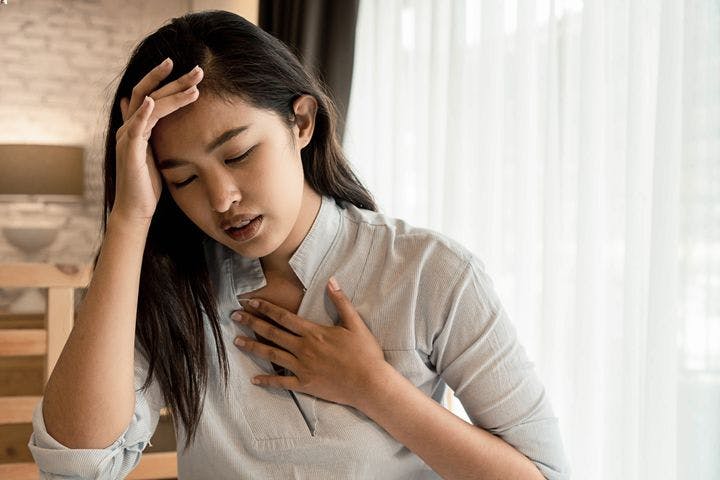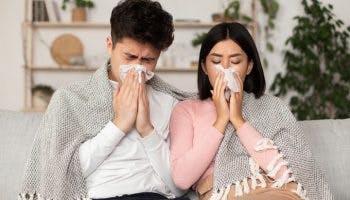Long COVID Symptoms: How the Virus Can Affect You in the Future
Published | 6 min read
“Long COVID” can last for weeks or months after the initial infection. The use of herbs may help ease your symptoms.

People who test positive for COVID-19 can generally recover within a few weeks. However, some may continue to experience new, returning or ongoing symptoms long after they’ve beaten the initial infection. These are known as Long COVID symptoms.
People of any age can be susceptible to the condition. However, Long COVID symptoms appear to be less common in children and adolescents as compared to adults.
According to Traditional Chinese Medicine (TCM), the occurrence, transmission and prognosis of the disease depend on the condition of vital qi (vital energy) in the body. Long COVID syndrome is mainly due to a Vital Qi Deficiency, which causes weakness and stagnation.
Weakness refers to a loss of blood, qi, yin and yang, and a weakening of the five organs – Heart, Liver, Lung, Kidney, and Spleen. Stagnation refers to the obstructed flow of blood and qi within the meridians, which results in external pathogenic factors lingering in the body.
Fortunately, there are ways to ease of Long COVID symptoms effectively. Here’s how to identify them.

New or Ongoing Symptoms
Clinical reports indicate that people with Long COVID usually experience a combination of different symptoms. TCM treatment is based on syndrome differentiation. The common syndromes for Long COVID are Lung Qi and Yin Deficiencies, Spleen Deficiency with Abundant Dampness, and Heart Blood and Qi Deficiencies.
A few of the symptoms that you may experience simultaneously are fatigue, brain fog, heart palpitations, insomnia, dizziness, shortness of breath, and a change in taste or smell.
Multi-organ Symptoms
More severe forms of the initial COVID-19 infection can make you susceptible to autoimmune disorders or symptoms that affect multiple organs at the same time. These symptoms can last for weeks or months after a full recovery from the virus.
Multi-organ effects impair a majority, if not all, bodily systems. An increase of catecholamines — hormones that the brain, nerve tissues, and adrenal glands produce — may precede and contribute to a cytokine storm. This syndrome provokes systemic inflammatory response syndrome (SIRS), acute respiratory distress syndrome (ARDS), multi-organ injury, shock, and death.
Deep vein thrombosis (DVT), ischemic stroke, and heart attacks are also prevalent in people with COVID-19. Ischemic cardiac injury can arise in people who may or may not have been previously diagnosed with coronary artery disease. The virus can also complicate the management of people on dialysis or who have undergone a kidney transplant.
Autoimmune conditions, on the other hand, occur when your immune system attacks healthy cells by mistake. This will then lead to inflammation or tissue damage in the affected parts of the body.
Multi-system Inflammatory Syndrome (MIS) is a rare paediatric disorder that can develop during or right after an infection. The condition will inflame certain body parts and can become Long COVID if multi-organ effects or symptoms like fever, bloodshot eyes or skin rash persist.
Symptoms of Hospitalisation
Hospitalisation and severe lung-related illnesses like COVID-19 can induce exhaustion and extreme weakness during the recovery phase. Likewise, admission to the Intensive Care Unit (ICU) for COVID-19 can also bring about detrimental health implications after a person goes home.
One example is post-traumatic stress disorder, which can extend over a long duration. Interestingly, some of these effects are also experienced by people who had mild or no symptoms during the infection.

Ways to Reduce the Severity of “Long COVID” Symptoms
You can consider several medical disciplinary approaches in the treatment of Long COVID. Separately, TCM can remedy its associated symptoms through syndrome differentiation. This approach enables TCM practitioners to prescribe suitable treatments for distinct syndromes that happen during various stages of a COVID-19 infection.
Get your vaccinations!
Studies show that you can halve your risk of developing Long COVID syndrome if you complete both doses of the COVID-19 vaccine. The occurrence of respiratory infections like pneumonia is also less common amongst people who have received the vaccine.
Consume a balanced diet
After recovering from a COVID-19 infection, you should eat smaller meal portions during the early stages. You can increase portion size when your appetite returns.
“Start with easily digestible foods that are light on the stomach, such as gruel. Incorporate other nutritious foods as you regain your appetite, such as congee with fish meat and chicken soup.
Limit your consumption of cold and raw foods, like fruits and salads. Avoid spicy and oily foods as they will trap dampness and further burden your Spleen and stomach”, advises Eu Yan Sang physician Lin Jia Yi.
You can also complement your diet with the use of various medicinal ingredients. Chinese yam (shan yao, 山药) and foxtail millet (xiao mi, 小米) can address Spleen and stomach weaknesses.
Snow fungus (xue er, 雪耳) and snow pears (xue li, 雪梨) can nourish yin and ensure adequate hydration. Rose petals (mei gui hua, 玫瑰花) can help regulate your emotions, whereas longan (long yan, 龙眼) or jujube fruit (da zao, 大枣) can help relieve insomnia.
Use herbal formulations
The consumption of herbal medications aims to strengthen vital qi through tonification and nourishment of the Lung and Spleen Yin. It’s also useful for eliminating pathogenic factors through toxin removal, and the clearing of Heat, stasis and Dampness.
According to Physician Lin, adding Poria (fu ling, 茯苓), Chinese barley (da mai, 大麦 ), Chinese yam, lily bulbs (bai he, 百合) and lotus seeds (lian zi, 蓮子) to your diet can help invigorate the Spleen and Lungs. The use of tangerine peel (chen pi, 陈皮) Euryale seeds (qian shi, 芡实) and Solomon’s Seal rhizome (yu zhu, 玉竹) can also help achieve a similar effect on the body.
Case Studies of People who Regained Their Health After Using Herbal Medications
Herbal medications successfully helped many patients recover from the after-effects of COVID-19. One of Physician Lin’s patients was experiencing fatigue, difficulty concentrating, flushed cheeks, and frequent headaches. She was also prone to constipation, dry eyes, poor appetite and sleep. Additionally, her tongue was red with a white coating, and her pulse rapid and thin.
Physician Lin diagnosed her with Lung Yin Deficiency with Internal Heat and Dampness. However, her condition improved significantly after consuming the prescribed herbal medication.
Another patient that Physician Lin treated felt constant and extreme fatigue, and breathlessness when she exercised. She was also vulnerable to joint aches, a dry mouth, and poor appetite and sleep. Her tongue was also red, and she had a weak pulse.
Physician Lin diagnosed her with Qi and Yin Deficiency with Blood Stasis. Herbal medications and acupuncture were proposed to improve blood circulation and tonify her qi and yin. Thankfully, the patient saw a remarkable increase in her energy levels, which eases her exercise routines.
Long COVID symptoms are becoming more common in people who recover from the initial infection. Incorporating several practices can help reduce syndrome severity. If you wish to use herbal ingredients or formulations, do speak to a clinical physician and TCM practitioner beforehand.
This will enable you to avoid potential contraindications with the COVID-19 vaccine and identify herbal ingredients or formulations that are suitable for your body constitution.
References
- Centers for Disease Control and Prevention. 2021. Post-COVID Conditions. [online] [Accessed 21 January 2022]
- National Library of Medicine. 2020. Effect of COVID-19 on the Organs. [online] [Accessed 21 January 2022]
- World Health Organization. 2021. Episode #47 - Post COVID-19 condition. [online] [Accessed 21 January 2022]
Share this article on






